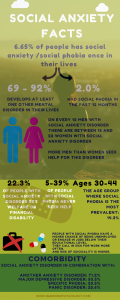Social anxiety causes.
What are typical social anxiety causes? What makes someone prone to developing social anxiety (disorder), or how is social anxiety triggered? There are different social anxiety causes and all have a slight different influence on the development or onset of social anxiety. Different social anxiety causes have a different effect on everyone. This means that not everyone develops the same social anxiety symptoms even though their social anxiety causes are similar. On this page we discuss the environmental influence, inheritance and the impact of traumatic events on the development of social anxiety. In therapy, it’s important to figure out how your social anxiety started and if social anxiety (or anxiety disorders in general) runs in the family, because the way social anxiety started can affect the course of treatment. For instance, someone who developed social anxiety after a traumatic event needs a slightly different approach compared to someone who’s parents have social anxiety (and most likely negatively affected the client’s upbringing).
At Barends Psychology Practice, we offer (online) counseling for social anxiety / social phobia. Contact us to schedule a first, free of charge, online session. (Depending on your health insurance, treatment may be reimbursed).
Quick jump-to menu:
What causes social anxiety disorder?
The exact cause of social anxiety disorder (social phobia) is still unknown, but research nowadays suggests that it is a combination of genetics and environment. Other possible social anxiety causes may be traumatic experiences or negative life experiences. An overview:
environmental factors
- One of the social anxiety causes may be the way someone was raised. As with everything: the way someone was raised by his caregivers influences him strongly as a person. Parents are the ones who teach their children the most. They do this by giving the child information or by setting an example. Children like to imitate their parents and usually accept everything their parents say as a fact. So if a parent is overprotective it could give the child the idea that the world out there is not safe. Controlling, rejecting or critical parents may negatively affect their child’s self-esteem and may also harm the social development.
- Culture may play a role in the development of social anxiety disorder. The way a society deals with shyness and avoidance affects shame, the ability to form relationships, or get a job, follow education. One study found that when parents use ‘shame’ as a disciplinary strategy and emphasize the importance of other’s opinion, American children have a higher chance of developing social anxiety disorder, whereas this was not the case for Chinese or Chinese/American children. Also, contrary to the western countries, children in China are more accepted by their peers if they are shy-inhibited. Another interesting finding: social anxiety disorder rates in Scandinavia are (slightly) higher than in Mediterranean countries. A possible explanation could be that Mediterranean cultures tend to spend more time outside their homes which them more social, compared to Scandinavian cultures (probably due to the weather).
(Advertisement. For more information, please scroll down.)
Genetic factors
- If a first degree relative (parents, siblings or offspring) has social anxiety disorder (social phobia) the chances of having it yourself are 2 to 3 times higher, compared to someone who has no first degree relative with social phobia. For identical twins even higher chances were found: 30% to 50% more likely to develop social phobia, compared to average.
- One of the genetic social anxiety causes may be: Behavioural inhibition (signs of inhibited, introspective or fearful nature). If behavioural inhibition in infants is still present during adolescence and adulthood, then there is a higher chance of developing social anxiety disorder. Behavioural inhibition is at least partly genetic.
Note: It is difficult to tell how much of the social anxiety is due to genetics and how much is due to the way someone is raised. Parents with social phobia usually tend to raise their children in a different (more protective) way than other parents. This affects the way a child develops.
Negative Life experiences
- Other social anxiety causes may be found in traumatic events. Experiencing, hearing about or witnessing a traumatizing event may be a trigger for social anxiety disorder. Experiencing an embarrassing moment in school, or on a birthday party, may negatively affect someone’s confidence and may cause a snowball effect: this experience may turn this person into a somewhat more shy person in certain situations (school, parties). This can result in less social interaction and may give that person the feeling that he or she is boring, not worth to chat with etc.. Such feelings can be devastating for someone’s self-esteem and may make that person even more shy and eventually withdraw from social situations.
- Bullying or harassment may be a trigger for social anxiety disorder. Bullying may cause someone to become very insecure, withdraw from social activities or not being invited to social activities. This may result in the same snowball effect as mentioned before.
- Other negative life experiences that may cause social anxiety are: being ignored, rejected, not fitting in.
Social anxiety causes, such as cultural factors, genetics, negative life experiences or the way someone has been raised, can have a huge impact on someone’s functioning on a social level. If left untreated, there is a good chance that social anxiety causes more and more problems, such as losing friends, social isolation, difficulty finding a job or keeping a job and more.

